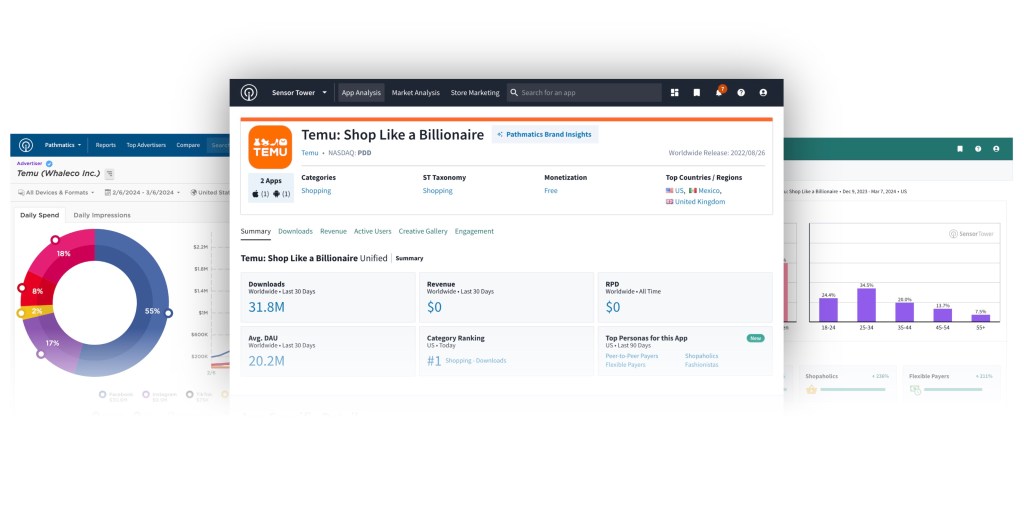
Sensor Tower, a leading app analytics firm, is acquiring rival Data.ai in a move that consolidates the mobile intelligence industry, creating a powerhouse that could dominate the sector and provide aggressively competitive insights into the app economy.
Sensor Tower and Data.ai help businesses and developers gain insight into how mobile apps are performing — offering estimates on downloads, active users, in-app revenue, and traction within specific demographic and competition benchmarks.
Sensor Tower said that the platforms, whose standard services command price tags upwards of tens of thousands of dollars, will remain available as standalone offerings for now, with no additional consumer-focused changes planned in the wake of the acquisition.
“We have long admired Data.ai’s stellar product and high-quality team. The acquisition will allow Sensor Tower to broaden its audience and expand its best-in-class offerings to any company that participates in the digital economy – helping bridge the gap between companies and consumers,” Sensor Tower CEO Oliver Yeh said in a statement.
Sensor Tower said that as part of the deal, it is laying off a number of employees from Data.ai’s team.
“Beyond the platform infrastructure and customer integration, Sensor Tower will absorb part of data.ai’s 400-person team and as such has announced a workforce reduction,” the company said in a statement.
Sensor Tower didn’t disclose the financial terms of the deal but said Bain Capital is providing credit-based financing. Separately, Riverwood Capital and Paramark Ventures have invested an undisclosed amount in Sensor Tower independent of the previous investments. Data.ai had $100 million in annual recurring revenue, TechCrunch as learned.
Paramark’s managing partner Chunsoo Kim said that this acquisition will have a big impact on the marketing world measuring the digital economy.
“We’re especially thrilled to support the team as they delve deeper into the dynamic APAC market, where the digital economy is booming,” he said in a statement.
Though the companies also compete with other players, including SimilarWeb and AppFigures, they were each other’s biggest rivals.
History of companies
The acquisition comes as a surprise, at least in terms of who ended up being the buyer. Data.ai had secured over three times the amount of funding compared to Sensor Tower, according to Crunchbase. Data.ai had raised over $157 million over various rounds, whereas Sensor Tower had raised just $46 million with Riverwood Capital as a majority shareholder.
A three-year-old regulatory penalty might be the key.
In 2021, the U.S. Securities and Exchange Commission (SEC) charged Data.ai with securities fraud. Bertrand Schmitt, the firm’s co-founder and former CEO and chairman, and the company agreed to pay $10 million in settlement. The SEC accused the firm of running “deceptive practices” for collecting data.
Data.ai told app developers that their data wasn’t shared with third parties directly. However, the SEC found that from 2014 through mid-2018, the firm shared intelligence data with third parties without properly anonymizing the information.
Sensor Tower also has had a fair share of controversies as critics have raised questions about its data collection practices. In March 2020, BuzzFeed News published a report that claimed that several VPN and ad-blocking apps didn’t disclose their connection to Sensor Tower and collected data secretly. Sensor Tower issued an apology in 2020 and said the company had taken the route it did to stay competitive.
In September 2023, it cut about 40 of 270+ staff, including executives in CMO and CFO roles.
Both Apple and Google have also made changes to their mobile operating systems in recent years that somewhat impede the ability of firms such as Sensor Tower and Data.ai to collect meaningful data.
Although both firms have had run-ins with their share of problematic situations, they continue to be immensely valuable to developers and businesses that are trying to gain a better understanding of users’ preferences. This makes it a little surprising that both companies continue to be frequently cited by publications including TechCrunch as well as The New York Times, The Wall Street Journal, CNBC, Bloomberg, and The Verge.
You can reach out to Ivan Mehta at [email protected] by email and through this link on Signal.


